It seems impossible that it has already been a year since we got married, since friends and family were here to celebrate with us. Time flies, that’s all there is to it.
Over the past few weeks, I’ve been reminiscing of all the great parties we had on and around our wedding day, and how great it was to have all those people visiting and sharing this special moment with us.
We had always thought we wanted something simple, and small. But in the end, we ended up having a completely different wedding! And we were very happy about it.
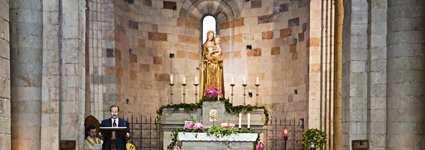
We soon discovered that getting married in Italy is not that simple… a lot of bureaucratic stuff to take care of, especially when the bride or groom is not Italian. Surprisingly enough, the religious paperwork (we had a Catholic wedding) was much more complicated and time-consuming than the civil one!
So, here is what getting married in Tuscany involved for us.
Catholic wedding in Tuscany
We had to take a “pre-marriage preparation course“: the so-called corso per fidanzati, “course for fiancés”. We had 8 meetings with the village priest and another engaged couple during which we discussed the meaning of the sacrament of marriage and other important issues. At the end of this course, we received a certificate of attendance, which we had to include in a file along with several other documents that the Church requested.
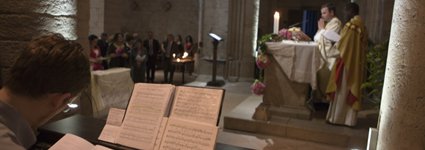
We had to hand in:
- a Baptism certificate also stating that we had been confirmed. We obtained it from the parishes where we were baptized.
- Since after we turned 16 we had lived in parishes different from the one where we were getting married, we had to ask the priests of the parishes where we had lived for more than 1 year a document that certified that we had never been married in those parishes. Since I was officially resident in Pisa (in Italy you need to declare to the local authorities where you live and get a formal permit of residency), I had to go to the parish in charge of the area where my apartment was. However, I had never attended to Mass there (we’re not in Pisa on the weekends), so the priest had no idea who I was. For this reason, I had to make an appointment with him and to bring along two friends who have known me for many years. They had to act as my witnesses and swear that, as far as they knew, I had never been married in a church before. This was quite complicated for my husband, because he is Canadian, and in Canada there is neither the strict concept of residency that we have here, nor a unique ecclesiastic register of weddings. So his Canadian parish had no idea what to declare. In the end he had to swear and sign a document in front of the priest of his present church of residency, who was putting our file together.
- Declaration that the Banns, a notice of your intention to wed, had been published and no objections against our marriage had been raised. Banns (“pubblicazioni“) were posted outside the church doors to allow anyone with valid reason to stop the wedding. We had to have banns published both in my parish in Pisa and one in my husband’s parish in Civitella.
When all these documents were ready, since we wanted to get married in a church where neither of us was formally resident, we had to go to Siena to the “Arcivescovado”, the Archbishop’s secretariat, to ask for a nulla osta, a certificate of non-impediment. We also had to hand in a document where we had to declare our intention to live our marriage according to the Catholic principles.

Once obtained the final permission from the office in Siena, we went to see the priest of the church where we wanted to get married. We had already spoken with him long before starting the whole process, of course, because we needed his permission to get married in his church. Normally, you should get married in your parish of residency. But I really wanted to get married in the Pieve ad Lamulas near Arcidosso, on Monte Amiata, because I had strong ties to that church. The priest asked us the personal data of our witnesses, the 4 people who would stand by our side on the wedding day and sign the documents. We don’t have bridesmaids, the maid of honour or the best man in Italy: we have two or four “witnesses”.This is a civil role, not a religious one, so in general, priests don’t require for them to be baptized Catholic.
Civil Requirements
In Italy, the Catholic Church and the State have special agreements: by getting married in a Church your wedding also has a civil value. Of course, you can also have a religious-only or civil-only wedding, if you wish. Since we wanted to have a “matrimonio concordatario“, a religious wedding with civil effects, before starting the religious procedures, we had to go to the local Town Hall for the “promessa di matrimonio“, the wedding promise, with two witnesses. In order to do this, my husband had to obtain from his consulate a certificate of non-impediment and to bring it to the Town Hall with his passport. Civil banns had to be published in the Town Hall as well. When they gave their permission for the wedding, we had 180 days to get married.
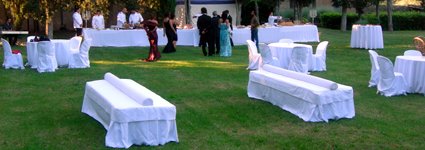
Invites, wedding flowers and catering services
For our wedding we had chosen a non-conventional colour palette: white, hot pink and apple green. Our brother-in-law designed our invitations, including maps, menus, Mass booklets, and the tableau. My grand-mother prepared hot pink table runners to match the colour of the translucent covers of the invite.
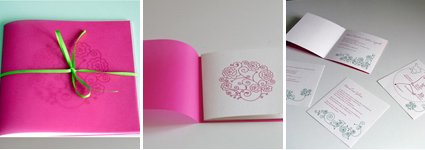
The wedding flowers were designed by an amazing florist, certainly one of the best in Tuscany, which we are so lucky to know, Lorella Cortecci from Fiori e Dintorni. We had to book her well in advance, because she’s always very busy. She also designed our wedding favours with the traditional almond candies, which we call “confetti”.
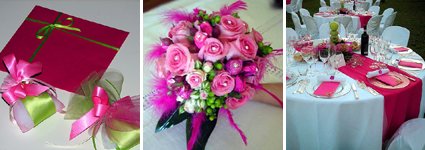
We hired Lo Scalco for the catering. We had already seen them at work at my cousin’s wedding at the Castle of Meleto in Chianti, between Siena and Florence, and they had done an amazing job. Finally we hired an artist from the agency of Daniel Cau for the music.
Our Locations
We had a dinner with friends and family on the day before the wedding so that our families could meet. They had never met before. We rented Il Passo degli Ulivi, a beautiful countryside home, and had a great BBQ party by the pool.
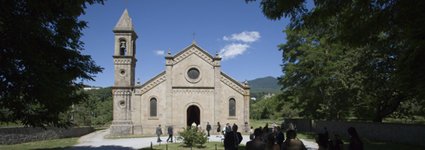
We got married in the beautiful Pieve di Santa Maria ad Lamulas at 4 p.m. After the ceremony, we had our wedding reception in the garden of the Castle of Grotti. We had the antipasti buffet in the garden by the cottage called La Guardiola, and then the dinner in the main garden of the Castle, opposite the beautiful Villa Ballati. The party with open bar went on until 3 am!
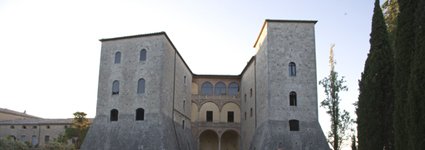
In Italy, you have a dinner reception for the family and the closest friends and then a second party open to all those who gave you a present, called a “rinfresco“. We had our Rinfresco at Podere Santa Maria, a beautiful villa in the countryside. We had a great buffet party with live music, and several people ended up in the pool before the end of the party! We had 300 guests there! It was great. We had the pleasure of seeing friends we hadn’t seen in a while!

Do you want to get married in Tuscany?

If you are planning on getting married in Tuscany, we can help you plan your perfect wedding! Contact us at info@athomeintuscany.org. Or you can visit the website of a friend’s wedding and event planning agency, Boutique Events.





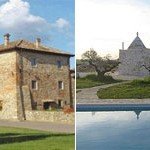
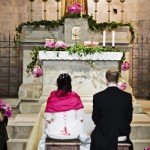



Wow, Gloria, does the Catholic church want people to get married or not. Here in the states the bride and groom have to sit through a dreaded “pre-Cana” conference which sounds similar to your meetings. Funny how someone (priest) who’s never been married needs to give advice to two people who will be. Glad you survived and tanti auguri.
I think they do, but they want to make sure that people get married in a church for the right reasons. In the end, it is a sacrament, not just the choice of a nice location. I confess we wondered too though, because in the end it was becoming a bit too much, as we had all sorts of other mishaps! It should probably be a bit easier. Anyway, we survived as you say!!
I believe the only thing we were really lucky with in all that was the pre-Cana course. Rather than having some priest tell us what was right and wrong, we had our meetings with a young priest from Congo. He didn’t want to give us any lesson, exactly for the reasons that you say. He admitted that the only things he could speak of were the religious meaning of the sacrament and the concept of commitment, since he had to commit himself to a certain type of life anyway. For the most part though, the meetings were more of a chat about what the choice of getting married meant to us in general, not only in a church, the value of family, etc. And I believe it was not bad to have a chance to think about those things also with other people who had different views. Not that we hadn’t thought about it… we had already lived together for 4 years… but it was kind of interesting.
Thank you for your comment!
What a lovely post…congrats on your anniversary!
Thank you!! I wrote this last year, but I thought it was a good way to remember a great day. That ended with me falling asleep under a cypress tree in the garden at 5am anyway… LOL